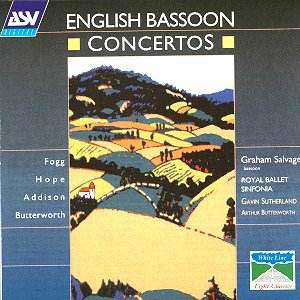ASV and Naxos have individually done more than any
of the majors to reignite the flame of British light music. In recent
years it has been ASV that has been the standard-bearer with a constant
flow of releases. Look at what they have done for Binge, Horovitz and
Gardner. Their catalogue is endlessly rewarding and their design attitude
and practice is full of individuality. And now to the present disc.
The bassoon does not have the glamour of the trumpet
or the violin or the mercurial celerity of the oboe. Nevertheless it
is an instrument of character, capable of scatological humour, burly
romance and mournful reverie. Composers can surprise us as Vaughan Williams
did for the Tuba in his concerto in which the central romance has nothing
of the pawky humour usually associated with the instrument; instead
we are given one of the most treasurable and lovely soliloquies.
The ASV selection is from the works of two composers
dead and two composers living. The Fogg has been on the cognoscenti's
want-list for years. Apart from a 1990s BBC broadcast there have been
few performances in recent years. Robert Gough's 1980s version with
the Windsor Sinfonia conducted by Robert Tucker at Broadheath was a
very welcome exception. The work was premiered by Archie Camden with
the BBCSO conducted by the composer on 20 August 1931 at the Queen's
Hall. Its popularity was suffocated by the Second World War and was
then largely forgotten. The Fogg is a work of jollity with almost-quotes
from The Rite and The Firebird. The writing is carefree.
It reminded me of Bax in his lighter and later vein - viz the Woodwind
Concertante of 1949 and earlier works including the still unrecorded
overture Work in Progress. The lumbering and then swiftly skittish
finale recalls Chabrier's España and contrasts with the
treacly burble of the Grave middle movement. Constant Lambert must surely
have loved this work.
Addison is extremely well known for A Bridge Too
Far (in which he trounces Walton) and for signature tunes like that
to Murder She Wrote. The Concertino (there are two on this disc)
evokes summer days and the South of France. His craftsmanship was learnt
from work on films in the 1940s and 1950s; a school of hard knocks.
Addison reminded me of Paul Carr (whose wonderful Claudio disc I reviewed
here). There is also a touch of Richard Rodney Bennett in his lightish
vein. The music glints brightly. It is classy and wanders adroitly into
tongue in cheek Grand Guignol. This is likeable music with a wink and
a smile in the same vein as Barber's Souvenirs. The Concertino
ends with the bassoon settling deep into the sable regions of the basso
register.
Peter Hope is much more eclectic. You may know his
name from his Ring of Kerry suite for orchestra. This won the
Ivor Novello award in 1968/69. Like Addison there is a shiver and a
smile in the music. Remarkable episodes abound. There is some lovely
writing for the strings high above the bassoon. The tom-toms reminded
me of Malcolm Arnold's Fourth Symphony and the Commonwealth Christmas
Overture. There is a bluesy second movement with a hint of the Motherless
Child spiritual. The finale is dazzlingly sunny music which sways
and rumbas along in delight. Perhaps the Sinfonia's string section are
not as plush in tone as the music requires but this is a momentary impression.
The final work is a complete contrast to the other
three. Arthur Butterworth, spurned by the London-based establishment,
has yet to secure the regard he deserves although things have improved.
I had hoped that the 1998 ClassicO CD of his First Symphony would put
that right. I was wrong. He has four seriously-intentioned and executed
symphonies to his name. He is influenced by the Nordic composers, especially
Sibelius, although he is no mere 'tribute' composer. In my view he merits
being counted in the same company as Vagn Holmboe and Roy Harris. His
violin concerto was premiered by the young Nigel Kennedy (who has not
returned to the work since then) and his smashing concert overture Mancunians
(written for the Lowry centenary and given a Bluitz of a run-through
by the Hallé several years ago) is every bit the equal of Elgar's
Cockaigne but with its sights fixed on the bustle and industry
of Manchester rather than bellicose and vainglorious Edwardian London.
Butterworth is one of the world's strongest composers.
Summer Music (a Concerto in all but name) is a work of lugubrious
gravity - an intriguing choice of title. The music is tonal and the
language is comparable with Delius in his North Country Sketches
matched with Sibelius's Fourth Symphony and with orchestral lines
from Rautavaara's Cantus Arcticus. Butterworth has produced a
chilly Egdon Heath of a work with emphasis on the lonely, the
plaintive and the melancholic. This is not light music (though there
is brilliance in the Sibelian chatter of the finale) and no harm in
that. Summer Music was written
for Alison Birkinshaw and premiered by her with the Settle Orchestra
in Yorkshire in 1987.
Humour, burly romance and mournful reverie are on display
here in Graham Salvage's hands: three light works and Butterworth's
concentrated mood picture of the Northern hills. A disc to cherish and
a disc you must have if you already have ASV's earlier volumes in the
light music series..
Rob Barnett


